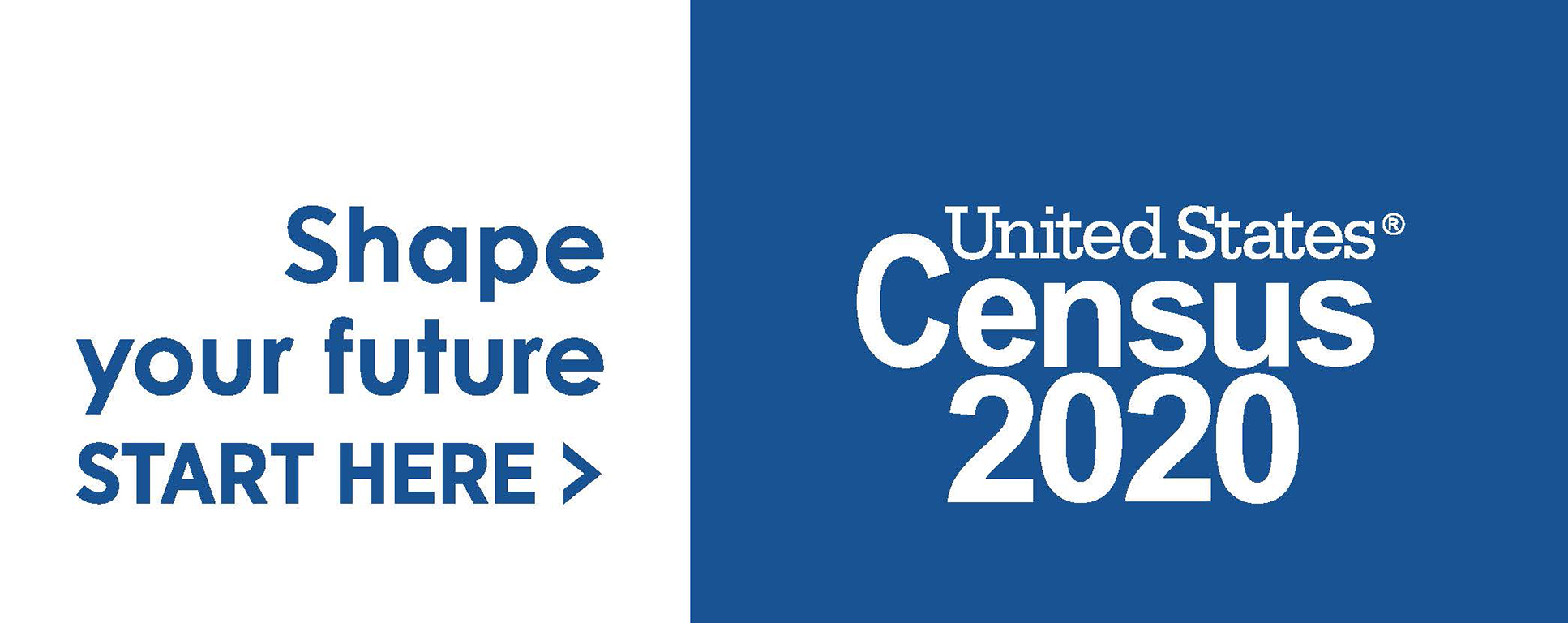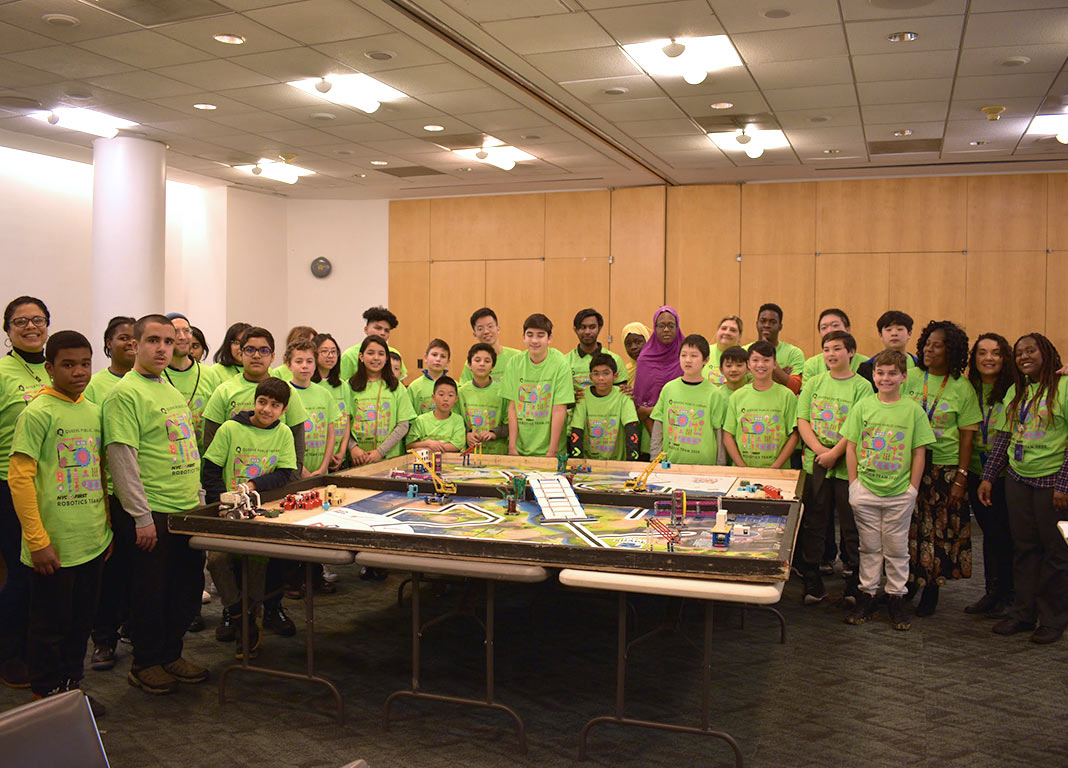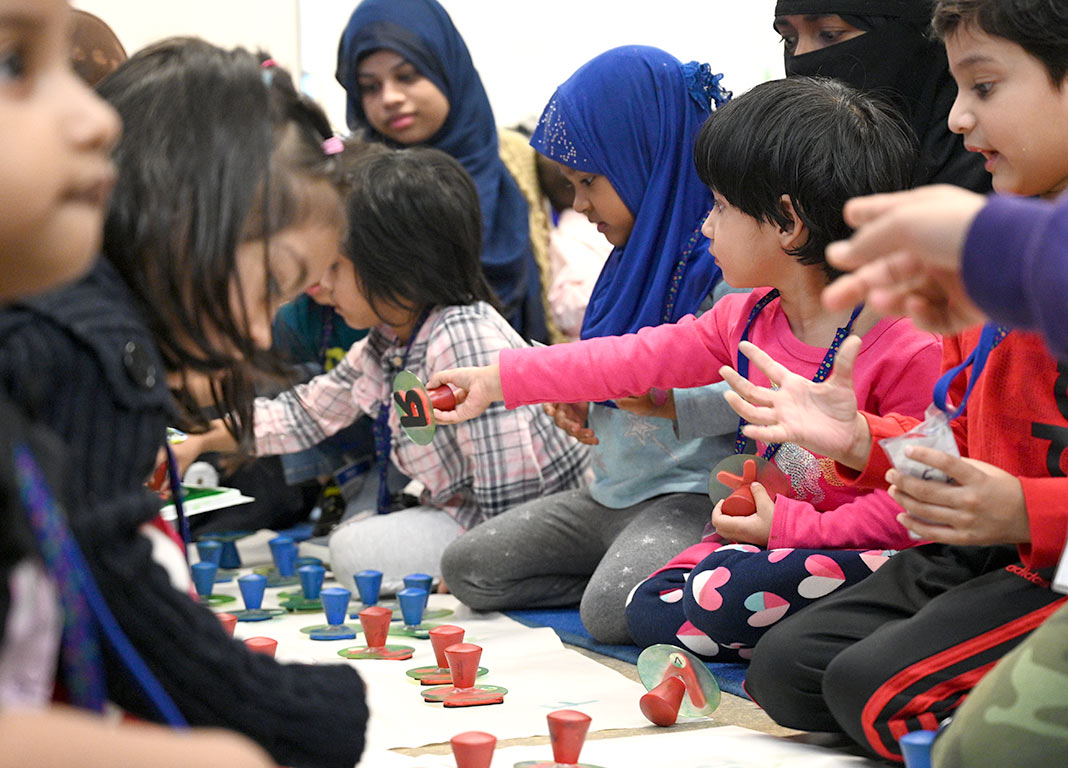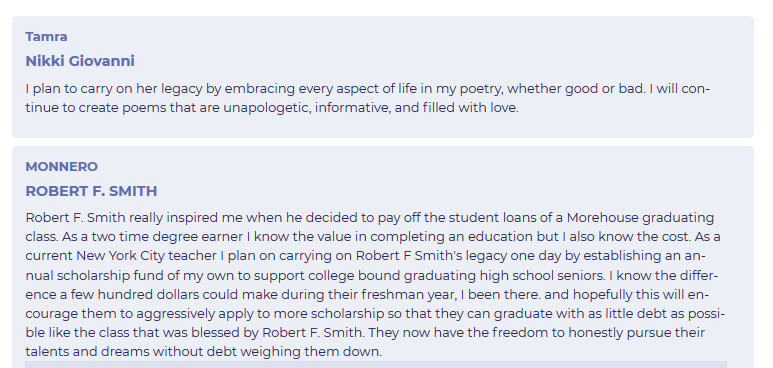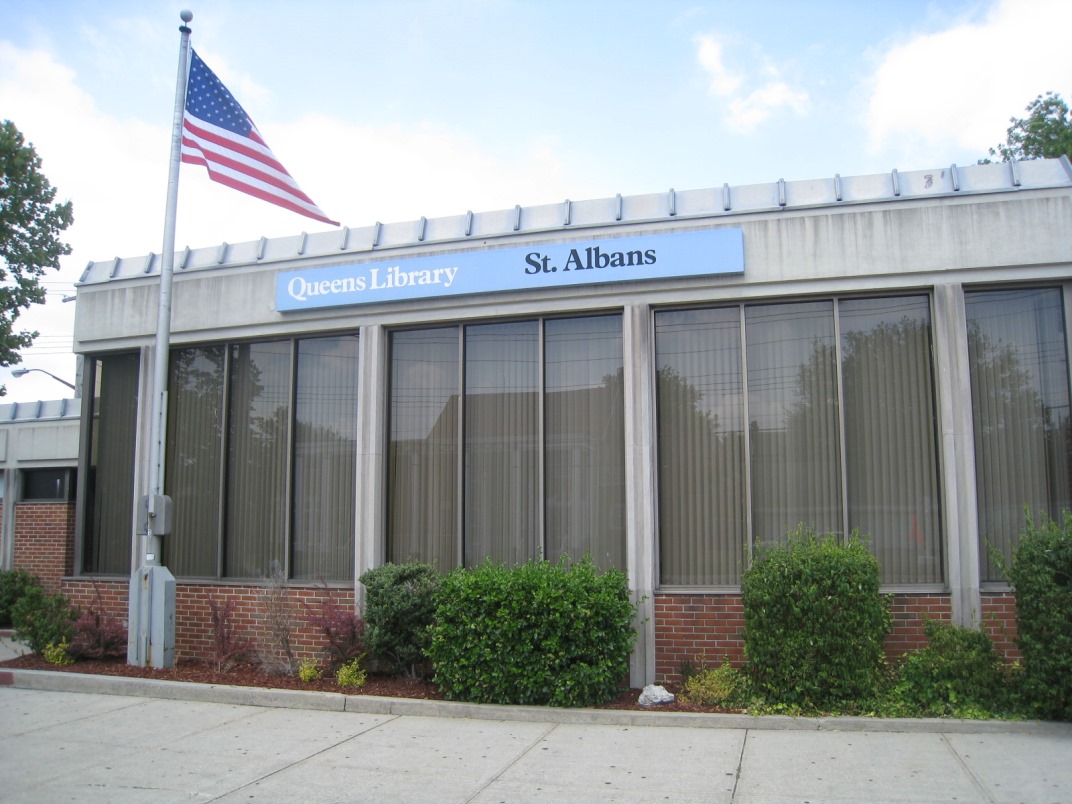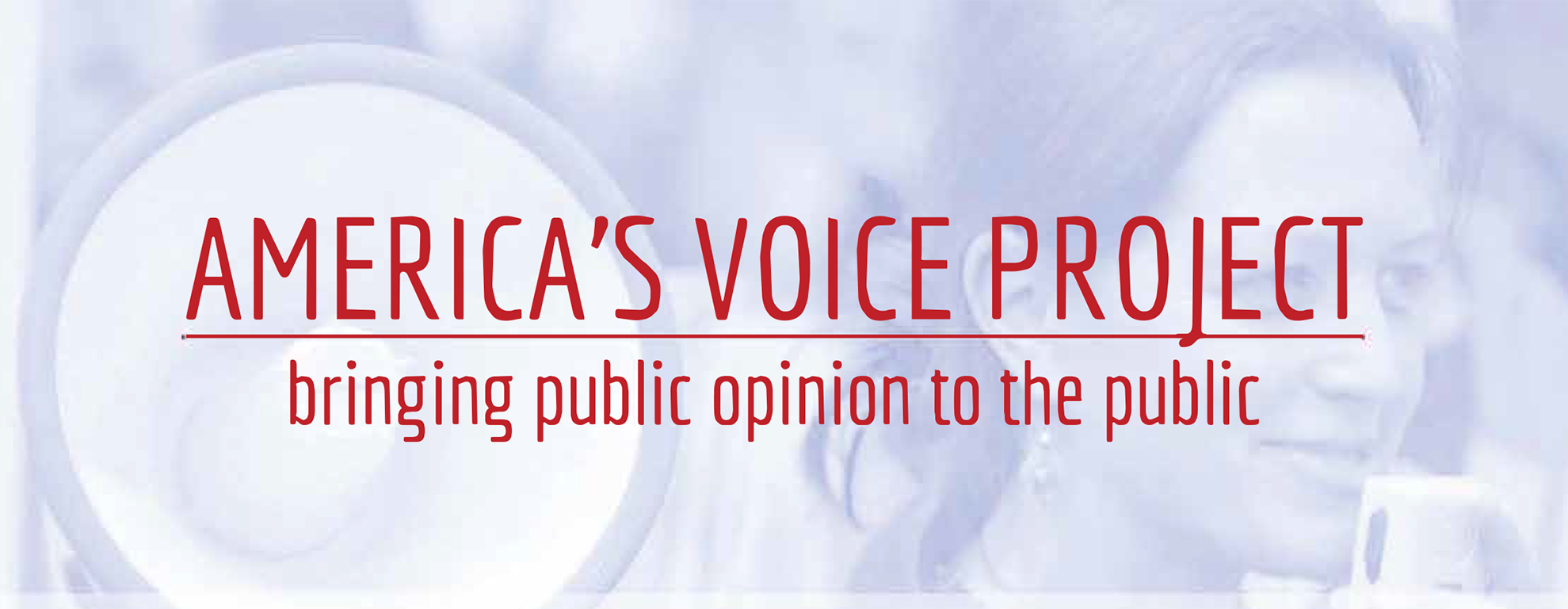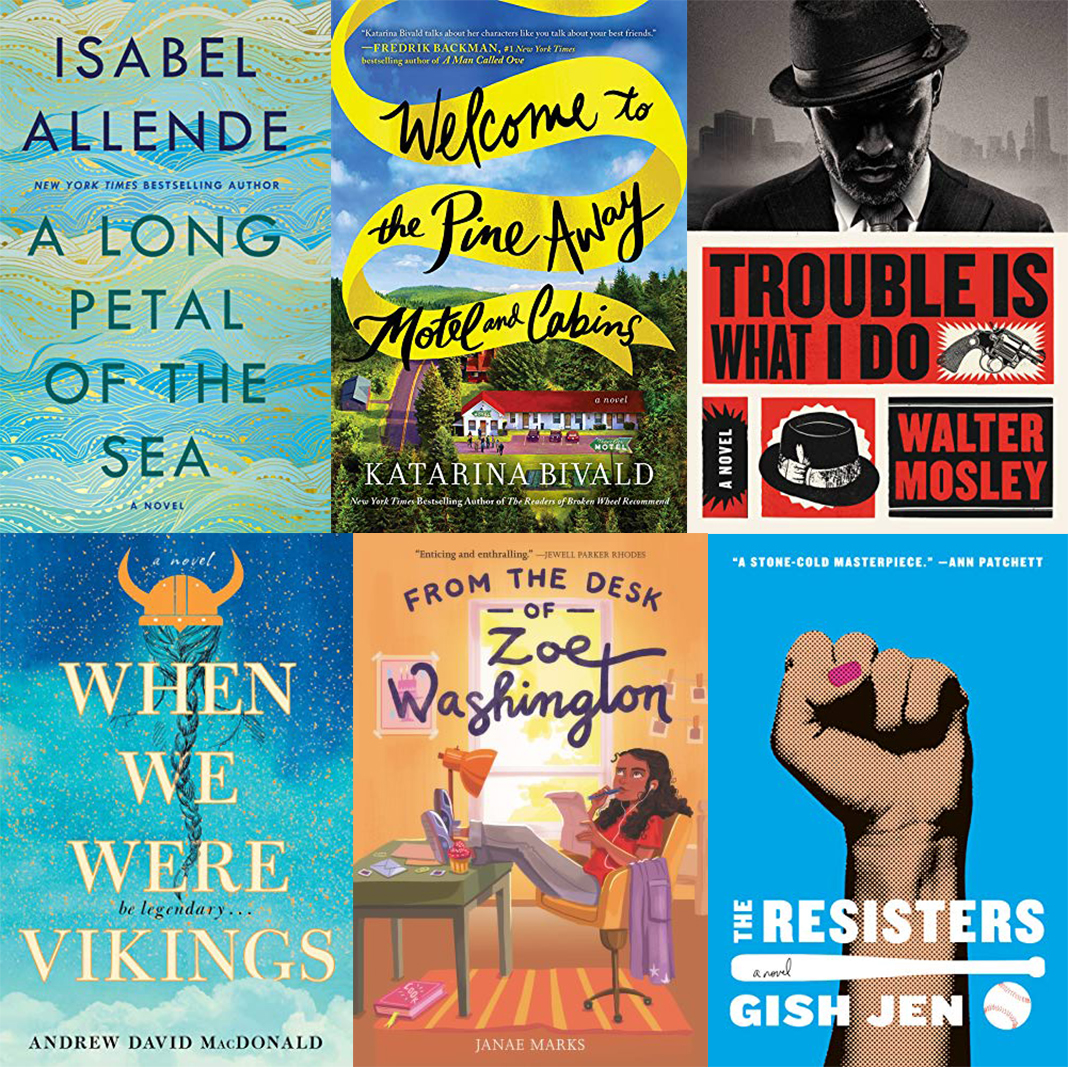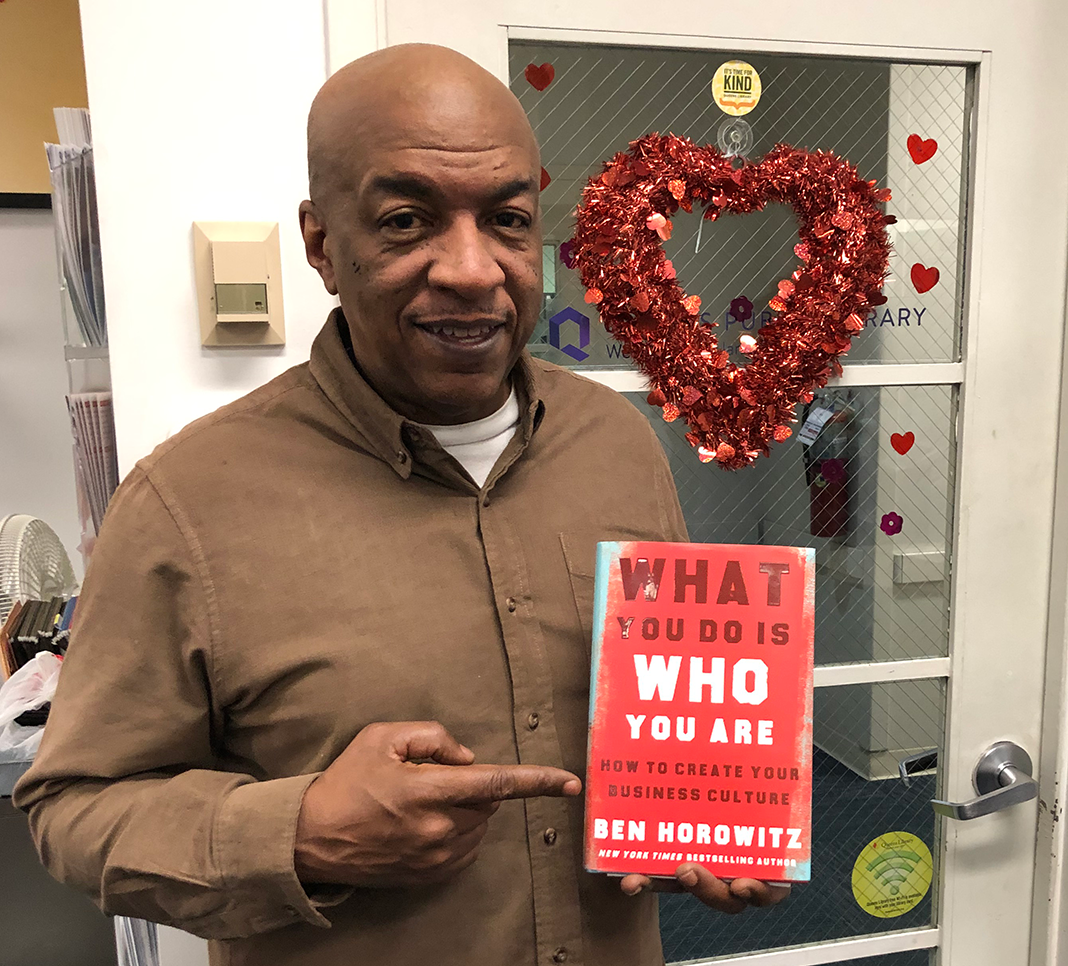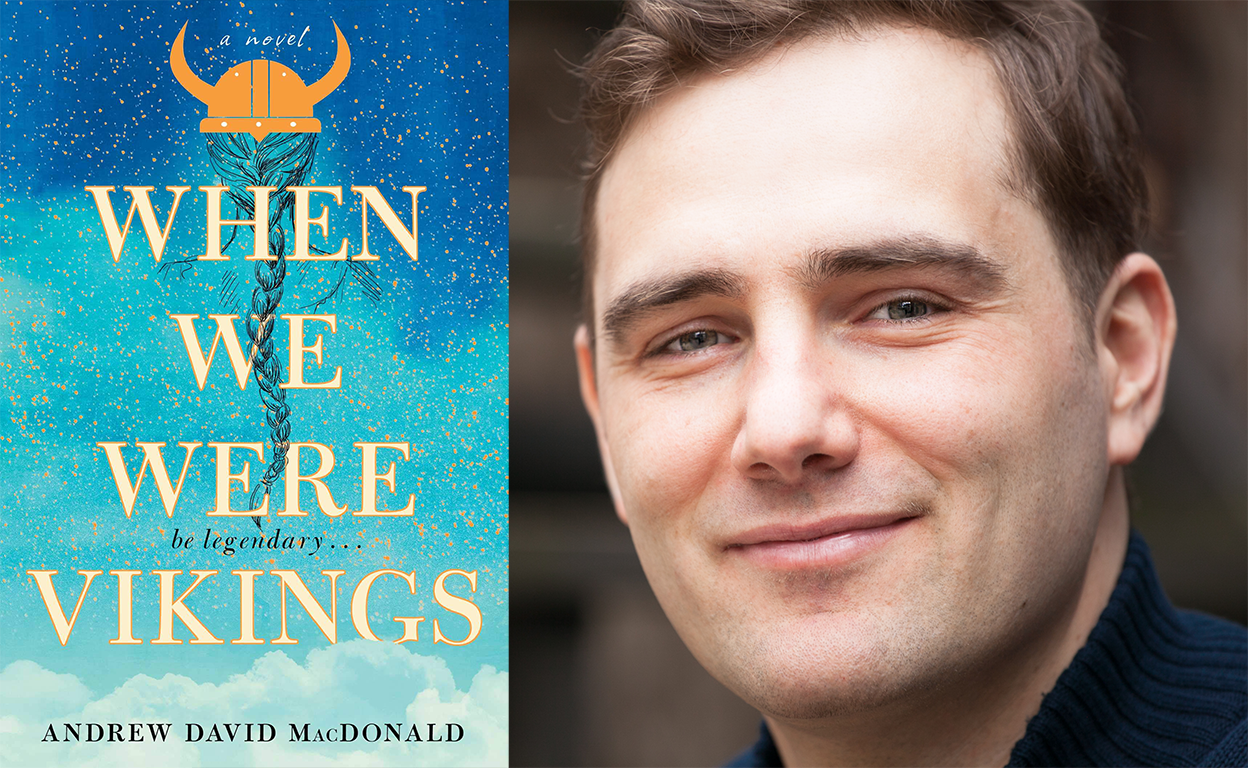The 2020 Census is an important event for our city, our state, and our country. It’s also a little complicated, and there’s a lot of information to absorb.
You can use any Internet connection and complete your Census form online here.
Here are some answers to your frequently asked questions. If you have any other questions or concerns, you can also visit our dedicated Census webpage at queenslibrary.org/census2020.
What is the Census?
It’s a count of every person living in the United States. The census is required by the U.S. Constitution to happen every 10 years.
Why is the Census important?
Based on the census, the U.S. government decides how to divide more than $650 billion in federal funding for programs and services like Medicaid, SNAP, and Head Start. State and city governments, local nonprofits, and businesses also use census data when they distribute local resources, decide where to build new schools and hospitals, apply for grants, or create jobs and fund libraries. The information collected by the census is used to determine how many seats New York will have in the U.S. House of Representatives. An accurate count of our state’s population means New York will get its fair share of seats. New York State lost two representatives after the 2010 Census!
How do I take the Census?
From March 12-20, the Census Bureau will mail a letter to every household asking them to complete the census in one of three ways: going online, using the phone, or—if the household receives one—mailing back a paper questionnaire. This is the first nationwide digital census; the Census Bureau estimates that 45% of Americans will complete the census online. The government would like everyone to complete the census by April 1, 2020, which is Census Day! From May to July 2020, census workers will do follow-up visits to people who haven’t responded. During this period, people can still respond online, by phone, or by mail.
What kind of questions do they ask on the Census?
The census questionnaire asks how many people are living or staying in your home, their age and gender, what their relationship is to the person filling out the questionnaire, and their racial and ethnic background. The Census Bureau will NEVER ask for your Social Security number, for money or donations, for anything on behalf of a political party, or for your bank or credit card account numbers.
What happens to the information that I give the Census Bureau?
Census responses are confidential and protected by federal law. Title 13 of the U.S. Code prevents Census Bureau employees from releasing identifiable information to anyone, including law enforcement and other government agencies. There is no cross-referencing of Census information with any other government document. Personalized Census data are only released for research use after 72 years.
What languages are available for the Census?
In addition to English, you can take the 2020 Census online in Spanish, Chinese, Vietnamese, Korean, Russian, Arabic, Tagalog, Polish, French, Haitian Creole, Portuguese, and Japanese. The paper form is only available in English and Spanish. The Census Bureau will provide video and print language guides in 59 non-English languages, including American Sign Language, as well as guides in Braille and large print.
Is there a citizenship question?
There is NO citizenship question on the 2020 Census.
How can I identify a Census worker who comes to my door?
They will present an ID with their name, photo, a Department of Commerce watermark, and an expiration date. They will have an official bag and Census Bureau-issued electronic device, such as laptop or smartphone, with the Census Bureau logo. They will do their work between 9am and 9pm. If you wish to verify their identity, please call 1-800-991-2520, the New York Regional Office, between 8am and 5pm Monday-Friday.
Tags
This February, teams of middle-school students arrived at Flushing Library for the QPL FIRST LEGO League Robotics Tournament. This exciting day involved parents and siblings as the audience for an event full of innovation and teamwork. The students spent 16 weeks preparing for the tournament.
The teams came from six branches: Bayside (two teams), Baisley Park, East Flushing, Kew Gardens Hills, Long Island City, and Queensboro Hill. About two dozen students competed in robot challenges and values demonstrations.
While everyone was a winner for participating, some teams got special recognition for their results and actions along the way.
Kew Gardens Hills & Long Island City’s combined team, City Shapers, came in first place in robotics mission challenges, with Bayside’s Baby Yoda in second and Bayside’s Team Robots in third.
For the core values category, East Flushing’s League of Geniuses came in first, Bayside’s Team Robots was second, and Queensboro Hill’s Ice Cream Destroyer was in third.
A grant from the Queens Public Library’s Innovation Fund and a partnership with New York City FIRST, a nonprofit that provides hands-on STEM education and robotics programs for 7,000 students each year, were part of making this event possible for the second year in a row!
Congratulations to all the participants and thank you to all of the library staff whose hard work contributed to making this such a special day.
One morning in the Children’s Library Discovery Center at Central Library, a group of 10 young children and their parents and caregivers gathered to learn the skills they need to be ready for school. The workshop’s theme was “fun in school,” and students were getting a taste of what happens in a pre-kindergarten classroom with singing, playing with blocks, using Play-Doh, and completing alphabet puzzles. The teacher, Indira Mukherjee, has taught the popular Kickoff to Kindergarten (K2K) workshop for the past five years and says that every moment is special. Students begin feeling shy, but by the end of the eight-week program their shyness is gone and they are singing out loud, she says.
Most importantly, there are changes in how parents and caregivers are interacting with their children outside of the program, and in how children act during the reading experience. As a result of K2K, families are able to have an active reading experience using tools like dialogic reading techniques. Dialogic reading techniques emphasize involving children in the reading experience by having a dialogue with them about the text through a process of prompting, evaluating, expanding, and repeating. The children, parents, and caregivers learn how to make reading an interactive activity, with children talking about their own experiences and how they relate to a book’s content, and with caregivers asking a variety of questions to elicit conversation with their children.
The program aims to prepare parents, caregivers, and children for formal schooling by increasing literacy skills and giving parents and caregivers the tools they need to help their children grow developmentally outside the library and the school setting. Gabriel Cortez, the program’s coordinator, says that empowering families to continue their children’s education at home is a key K2K goal.
“This is the Mommy Q and this is the baby q,” says Seema Ahmed as she works with her daughter Alifa Zaman to fill in a stencil with Play-Doh. Ahmed says that K2K is a great opportunity to join other families and to acquire skills and tools that support overall development. Alifa is otherwise often home without many opportunities for playdates. “We love coming,” Ahmed says. “There’s so much that she takes away from it.” She also notices that her daughter has developed social skills and critical thinking. The program helps Ahmed evaluate her daughter’s progress and reflect on areas she needs to work on with her. As she says, the K2K curriculum is both “creative and educational,” and “some of the things I learned from the teacher I would never think about myself, such as how to integrate experiences into reading.”
Mariam Marzwk joined the class because she wanted to be more involved in her son Eesa’s learning process and to give him a chance to interact with other kids his age; she also believes he is now more prepared for kindergarten. The program includes screening in the second and seventh weeks so that parents can understand how their children are learning. Each week, families receive a free book and at-home projects designed to have them work together, such as drawing their day, to continue the learning experience outside the library.
K2K is offered across the borough at many Queens Public Library locations each season. There’s even an Advanced Kickoff to Kindergarten program for families that have completed the first eight-week session and are looking for more. K2K is offered in English and Spanish, and bilingual staff are available in Chinese and Bengali. Contact program coordinator Gabriel Cortez at gcortez@queenslibrary.org for more information on the Kickoff to Kindergarten program.
Locations and Dates for Spring 2020: To preregister for any of these programs, please call the location.
Bayside (718) 229-1834
Tuesdays, April 28, May 5, 12, 19, 26, June 2, 9, 16
10:00 AM – 11:30 AM
Bellerose (718) 831-8644
Fridays, April 24, May 1, 8, 15, 22, 29, June 5, 12
10:30 AM – 12:00 PM
Briarwood (718) 658-1680
Fridays May 1, 8, 15, 22, 29, June 5, 12, 19
10:30 AM – 12:00 PM
CLDC (718) 990-0767
Tuesdays, April 7, 14, 21, 28, May 5, 19, 26, June 2
No class on May 12
10:30 – 12:00 PM
Corona (718) 426-2844
Tuesdays, April 14, 21, 28, May 5, 12, 19, 26, June 2
10:30 AM – 12:00 PM
English-Spanish bilingual class
Thursdays, April 9, 16, 23, 30, May 7, 14, 21, 28
10:30 AM – 12:00 PM
Spanish-only class
Flushing (718) 661-1200
Tuesdays, April 7, 14, 21, 28, March 5, 12, 19, 26
11:30 AM – 1:00 PM
Glen Oaks (718) 831-8636
Mondays, March 23, 30, April 6, 13, 20, 27, May 4, 11
10:00 AM – 11:30 AM
Jackson Heights (718) 899-2500
Mondays, April 20, 27, May 4, 11, 18, June 1, 8, 15
No class on May 25
11:00 AM – 12:30 PM
Langston Hughes (718) 651-1100
Mondays, April 20, 27, May 4, 11, 18, June 1, 8, 15
No class on May 25
10:00 AM – 11:30 AM
Spanish-only class
Peninsula (718) 634-1110
Tuesdays, April 21, 28, May 5, 12, 19, 26, June 2, 9
3:15 PM – 4:45 PM
Pomonok (718) 591-4343
Fridays, April 17, 24, May 1, 8, 15, 22, June 5, 12
No class on May 29
10:30 AM – 12:00 PM
Sunnyside (718) 784-3033
Tuesdays, April 21, 28, May 5, 12, 19, 26, June 2, 9
10:30 AM – 12:00 PM
Windsor Park (718) 468-8300
Tuesdays, March 17, 24, 31, April 7, 14, 21, 28, May 5
10:30 AM – 12:00 PM
Our Black History Month celebration of African American icons past and present is nearing its end, but there are still great programs and events for you to enjoy and participate in at our libraries!
We want to know how you or someone you know has been inspired by an African American trailblazer to carry on their legacy. What have you done or do you plan to do that will advance their achievements? Visit our Sharing Stories page and enter your story for a chance to win a Black History book bundle!
You can visit your local library to see our Spotlight posters and learn about African American icons past and present. These icons, and many more, are also available online!
You can play our Black History Month Memory Game, match the cards of African-American icons, and learn something new while playing; try a round of “From … To ...” and test your trivia knowledge by connecting the icons of the past with the people who continue their legacy; or step In the Footsteps of Art Giants and create your own masterpiece inspired by an exciting new generation of African American artists.
Don’t miss our remaining Black History Month programs, including author talks, art and crafts events, film screenings, concerts, and much more. When you attend a program, you can even receive one of our special commemorative Black History posters, but only while supplies last! And don’t forget to check out these wonderful Black History Month book displays!
We hope you will continue to Go Far, Go Together with us for the rest of Black History Month!
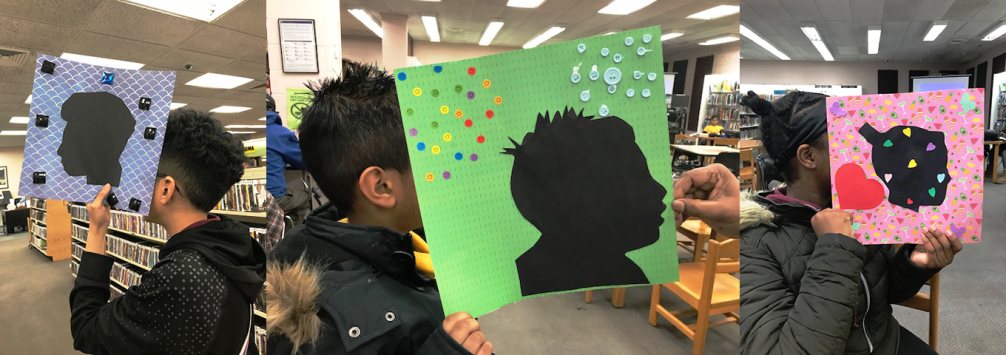
Tags
On April 21, 2020, Queens Public Library’s St. Albans branch will celebrate its centennial. The present building, located at 191-05 Linden Boulevard, was erected in 1968 and dedicated on March 10, 1969. Prior to this time, the library was located near Everitt Place and Linden Boulevard (not far from the St. Albans Long Island Rail Road stop).
The St. Albans area has a rich and unique history. It was the home of musical legends such as Count Basie, Ella Fitzgerald, John Coltrane, and Lena Horne. The historian and sociologist W. E. B. Du Bois once lived in the area, as well as broadcaster Al Roker and QPL President and CEO Dennis M. Walcott. A section of St. Albans, known as Addisleigh Park, has been designated a landmark district. The Friends of St. Albans Library were very involved with this initiative.
In recent years, the area has undergone demographic changes, with long-term African American residents moving away and new Americans from the Caribbean, Central America, and West Africa moving in. In an effort to serve its customers, St. Albans Library provides vital resources, such as computer access to those seeking employment and homework and enrichment activities through the STACKS afterschool program. STACKS complements the efforts of teachers and parents and began at St. Albans Library as a result of feedback regarding the challenges faced by local students and the desire for academic support.
St. Albans Library, as a community hub and “village square,” has a great opportunity and responsibility to present the rich history of St. Albans to people who may not be familiar with its legacy. At the same time, it can showcase the history and culture of the area's new residents.
As such, its planned activities and programs during the centennial will include musical programs highlighting jazz legends as well as programming that will reach out to new Americans and help them share their stories.
We hope you will join us all year long for the St. Albans centennial!
New Collaboration Brings Public Opinion to the Public Through the Queens Public Library System
Non-Profits, Media, Educators and Engaged Citizens Can Access Current and Historical Public Opinion Data
Queens, NY (February 18, 2020)—Among other things, public libraries equip citizens for democracy. An innovative collaboration between the Queens Public Library and the Roper Center for Public Opinion Research at Cornell University offers a new tool to library users in Queens: a database of current and historical polling data. The America’s Voice Project will give patrons access to the Roper Center database of polling questions in time for the 2020 election.
By becoming the first large public library system in the country to provide access to the Roper Center’s database of over 725,000 poll questions from 1935 to today, the Queens Public Library displays its commitment to cultivating an informed and engaged citizenry.
Queens Public Library Chief Librarian Nick Buron said, “Our library staff are very enthusiastic to learn about this extraordinary resource and help library users discover what others have thought about the great debates of their time.”
Established in 1947, the Roper Center holds the largest archival collection of polling data in the world, representing the voices of millions of survey respondents. The surveys offer information on public beliefs, attitudes and experiences related to politics, social issues, health, and more.
“Part of our mission is dissemination of information about public opinion from the ever-expanding Roper Center archive,” stated Professor Robert Shapiro, Chair of the Board of Directors at Roper Center and Wallace S. Sayre Professor of Government and International and Public Affairs at Columbia University. “The America’s Voice Project will educate new users in schools, local media and non-profits, and citizens about public opinion research and give them much-needed context for better understanding the polls they see daily in the news. These polls tell us much about the voice of the people in our American democracy."
About Queens Public Library
Queens Public Library is one of the largest and busiest public library systems in the United States, dedicated to serving the most ethnically and culturally diverse area in the country. An independent, non-profit organization founded in 1896, Queens Public Library offers free access to a collection of more than 5 million books and other materials in multiple languages, technology and digital resources, and more than 87,500 educational, cultural, and civic programs a year. It consists of 66 locations, including branch libraries, a Central Library, seven adult learning centers, a technology lab, two universal pre-kindergartens, and two teen centers.
About the Roper Center for Public Opinion Research
Founded in 1947 by Elmo Roper, the Roper Center for Public Opinion Research continues to play a crucial role in the advancement of the field of public opinion research. The Center’s mission is to collect, preserve, and disseminate public opinion data; to serve as a resource to help improve the practice of survey research; and to broaden the understanding of public opinion through the use of survey data in the United States and around the world. The digital archive, also known as Roper iPoll, includes data from as early as 1935 and offers users over 725,000 questions and more than 25,000 datasets, expanding daily as questions and surveys are added to study records. In addition to Roper iPoll the Center retains a physical collection in its offices on the Cornell University campus in Ithaca, NY. A 501 (c)(3), non-profit, the Roper Center is hosted at Cornell University. Annually, the Roper Center Board of Directors recognizes professional contributions to the field of public opinion research by awarding the Warren J. Mitofsky Award. On the web at https://ropercenter.cornell.edu/. Inquiries to media@ropercenter.org.
Contact: Queens Public Library—Ewa Kern-Jedrychowska, 718-990-0706; The Roper Center for Public Opinion Research at Cornell University—Brett M. Powell, 607-255-6507
###
Here are some of the new books coming to the Library for adults, children, and teens—from magical children’s books to historical fiction to books for Black History Month.
January 7, 2020
Welcome to the Pine Away Motel and Cabins (adult)
by Katarina Bivald
The latest book by the New York Times bestselling author of The Readers of Broken Wheel Recommend, this novel explores what happens when the owner of a motel dies but sticks around to have a positive influence on the life of her friends.
January 14, 2020
From the Desk of Zoe Washington (children)
by Janae Marks
Debut author Marks crafts a tale of a twelve-year-old wondering how to respond to a letter from her imprisoned father, who claims to be innocent of the crime for which he’s behind bars.
January 14, 2020
Infinity Son (YA)
by Adam Silvera
New York Times bestselling author Silvera creates a world in which two brothers are involved with a magical war, playing roles that neither ever expected.
January 21, 2020
A Long Petal of the Sea (adult)
by Isabel Allende
The beloved novelist returns with a historical fiction novel about the aftermath of the Spanish Civil War and refugees’ search for a new home.
January 21, 2020
Tweet Cute (YA)
by Emma Lord
This up-to-the-minute romance features a pair of high school students whose families run competing businesses. The two begin a Twitter war that goes viral, paving the way for them to fall in love on an anonymous chat app.
January 28, 2020
When We Were Vikings (adult)
by Andrew David MacDonald
First-time novelist MacDonald’s story centers on a twenty-one-year old woman with a cognitive disability as she tries to navigate and cope with the dangerous ways her brother has found to support the two.
January 28, 2020
When You Trap a Tiger (children)
by Tae Keller
Starred by Booklist, Kirkus, and Publishers Weekly, this story features Lily, who moves in with her sick grandmother only to encounter a magical tiger. The tiger leads her to discover a family secret and to face up to her fears.
February 4, 2020
Chirp (children)
by Kate Messner
This story about friendship and family was starred by Booklist and School Library Connection. Mia’s grandmother suffered a stroke months ago—and now she’s convinced someone is trying to sabotage her cricket farm. Mia, the new girl in town, tries to discover the truth about what’s really happening with the cricket farm while keeping a secret from her new friends.
February 4, 2020
The Resisters (adult)
by Gish Jen
Starred by Kirkus, this dystopian novel explores America as a surveillance state in which Artificial Intelligence is almost human. A girl with an incredible talent for baseball is born to a couple who is known as part of “The Surplus.”
February 25, 2020
Trouble Is What I Do (adult)
by Walter Mosley
Bestselling author Mosley returns with his popular Leonid McGill detective series, in an adventure that has McGill’s client facing a hit on his life.
Books for Black History Month
January 7, 2020
Overground Railroad (children)
by Lesa Cline-Ransome; illustrated by James E. Ransome
This picture book from an award-winning author and illustrator team presents the Great Migration from a child’s eyes, in poems and collage art. Ruth Ellen travels from North Carolina to New York City, chronicling her family’s journey north.
April 7, 2020
Sing and Shout: The Mighty Voice of Paul Robeson (YA)
by Susan Goldman Rubin
This meticulously researched biography tells the life story of activist, actor, and singer Paul Robeson. The book emphasizes his love of spirituals, his struggles as a result of his activism, and his refusal to ever stop speaking out.
We asked QPL Hip Hop Coordinator Ralph McDaniels to talk about Ben Horowitz’s new book What You Do Is Who You Are and his upcoming author event with Horowitz on Thursday, February 13 at Central Library.
Ben Horowitz’s new book What You Do Is Who You Are asks the question: What kind of culture or vibe does your company represent? Ben looks at business culture and uses examples from various cultural movements, the Haitian Revolution, and even prison life in his book.
While I read What You Do Is Who You Are, I thought about Ben’s love for Hip Hop, and the book reminds me of the early days of Def Jam Recordings.
Most Def Jam artists were edgy and controversial. That company’s staff were young people in jeans and hoodies; some were right off the street. They looked and talked just like their audience. Def Jam created a culture in business that was different from the traditional record companies before them, one that was very successful.
I’ll talk to Ben about companies like Def Jam, his thoughts on how young entrepreneurs can maximize their success and stay true to who they are, why he decided to donate 100 percent of the profits from his book to helping people who get out of jail stay out of jail and rebuilding Haiti, and much more. See you on February 13.
Come check out the book or DVD of your favorite Oscar nominee or winner. Here are the Oscar nominees and winners that we have at the library.
Oscar Winners:
Ford v Ferrari: Best Film Editing, Best Sound Editing
Hair Love: Book: Best Animated Short Film (you can also watch it here)
JoJo Rabbit: Book: Best Adapted Screenplay
Joker: Best Actor, Best Original Score
Judy: Best Actress
Little Women: Book: Best Costume Design
Once Upon a Time In Hollywood: Best Supporting Actor, Best Production Design
Parasite: Best Picture, Best Director, Best International Feature Film, Best Original Screenplay
Rocketman: Best Original Song
Toy Story 4: Book & DVD: Best Animated Film
Oscar Nominees:
A Beautiful Day in the Neighborhood: Book & DVD: Actor in a Supporting Role
Avengers: Endgame: Best Visual Effects
For Sama: Best Documentary Feature
Frozen II: Book: Best Original Song
Harriet: Best Actress, Best Original Song
Honeyland: Best Documentary Feature, Best Foreign Language Film
How to Train Your Dragon: The Hidden World: Book & DVD: Best Animated Feature
The Irishman: Book: Best Supporting Actor, Best Cinematography, Best Costume Design, Best Director, Best Film Editing, Best Picture, Best Production Design, Best Visual Effects & Best Adapted Screenplay
The Lighthouse: Best Cinematography
Missing Link: Best Animated Feature
Pain and Glory: Actor in a Leading Role, Best International Feature Film
Richard Jewell: Book: Best Supporting Actress
The Two Popes: Book: Actor in a Leading Role, Actor in a Supporting Role, Writing (Adapted Screenplay)
Tags
Andrew David MacDonald, debut author of When We Were Vikings, doesn’t have the Internet at home or on his phone, so he does everything online in libraries, coffee shops, and his favorite—coffee shops in libraries. He wrote a lot of his first book in several libraries in Canada and the United States, including in New York. He says that while he was growing up, “libraries were a kind of safe haven” from a “tumultuous” upbringing. He enjoyed fantasy books, often swiping books from his older brother who had checked them out.
MacDonald’s hope for his writing is to make readers feel things for characters they care about, a goal he established after crying while reading John Irving’s The World According to Garp. He says he was also influenced by Ken Kesey’s One Flew Over the Cuckoo’s Nest because he “grew up around mental illness and the world of the psych ward Kesey writes about was experienced by a family member.” He’s also a big fan of Zadie Smith and Michael Chabon.
The author’s novel began as a short story from the perspective of Gert, the brother of the novel’s main character, Zelda. After he finished the story, MacDonald was intrigued by what might be happening to the characters and began tinkering with writing from Zelda’s point of view. What emerged clearly was that Zelda was obsessed with Vikings and that the brother-sister duo merited “an entire novel’s worth of life (if not more).”
Zelda is a woman with a cognitive disability who reminds MacDonald of his mother, who was in and out of psych wards when he was a child. His father drove trucks and was often gone for weeks at a time, leaving him alone with his brother.
The novel was very personal for MacDonald: “Like Gert, Zelda’s brother, I felt a lot of resentment at having to be more adult and responsible than I was probably ready to be, but over the course of writing the novel I started to understand more clearly how bravely my mom struggled to rise above a mental illness that often impeded her ability to live her dreams. In a way, Zelda is my way of showing her I understand.”
MacDonald believes that “the more widely artists of all stripes can represent the diversity of the human experience, the better.” Jessica Grant’s novel Come Thou, Tortoise helped inspire him to create a neurodiverse character. When We Were Vikings is about a pair of siblings who try to live legendary lives, despite obstacles. “The struggle to self-actualize and live a generous, thoughtful life in pursuit of one’s dreams is the most legendary life I can think of,” the author says, and “the more we can see one another as multidimensional human beings, warts and all, and offer compassion to ourselves and others, the better.”
When We Were Vikings is available now at Queens Public Library.
Photo of Andrew David MacDonald by Lisa Rivers.
